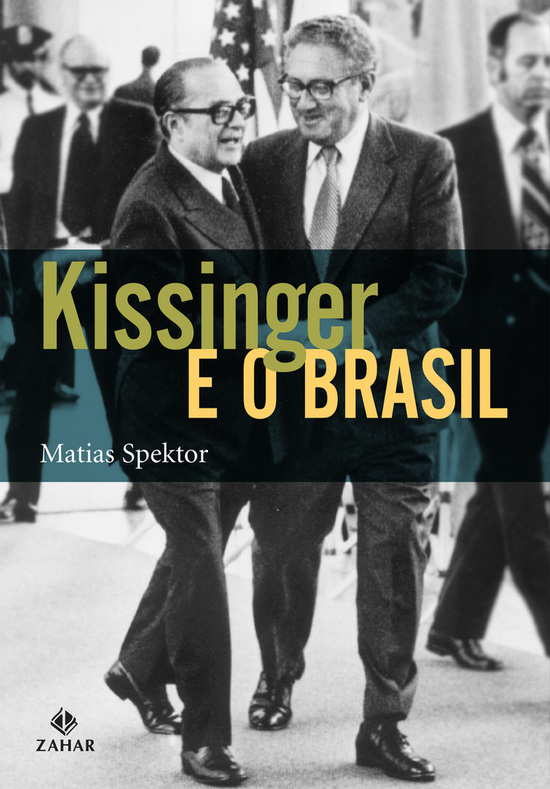Book review. Kissinger e o Brasil (Kissinger and Brazil) by Matias Spektor. Zahar, 2008. 234 pages. R$ 29,90 (www.amazon.com.br)
Irrespective of who will win Brazil’s presidential election in late October, one key foreign policy challenge awaits the next government: Brazil must seek to improve ties with the United States, which reached its nadir when Dilma Rousseff canceled a state visit to Washington, D.C. over the spying revelations in late 2013. Yet US-Brazil relations have historically been marred by a lack of mutual understanding and trust, unrealistic expectations or outright negligence, as Matias Spektor’s Kissinger e o Brasil (Kissinger and Brazil) shows.
The book describes an interesting effort to establish a US-Brazil alliance that culminated in the 1976 visit of Henry Kissinger to Brazil and the signing of an accord that institutionalized regular high-level consultations. Kissinger was convinced of Brazil’s importance. Along with Iran, Indonesia and South Africa, to which the United States should delegate some authority to maintain its hegemony, Brazil was, to his mind, a potentially important partner and a key element in combating communism in the region.
Kissinger’s initiative coincided with Brazilian Foreign Minister Azeredo da Silveira’s historic attempt to strengthen Brazil’s global power projection, a project described as “ecumenic and responsible pragmatism”, which involved engaging with countries irrespective of their ideological orientations. The relationship between the two foreign ministers – both individuals that influenced their respective countries’ foreign policies for decades to come – is the central theme of this highly informative and well-written analysis.
Kissinger’s plan ultimately failed the test of time. Shortly after the establishment of regular high-level talks, Brazil fell out of favor with incoming President Jimmy Carter, who openly criticized Kissinger’s strategy and the Brazilian military dictatorship’s human rights record. Yet even before that, cooperation was marked by frequent disappointment and misunderstanding. Kissinger wrongly assumed that Brazil would turn into a U.S. ally against OPEC and that policy makers in Brasília would abandon their nuclear ambitions. The Brazilian government, on the other hand, failed to achieve a reduction of U.S. tariffs on Brazilian exports. According to Spektor, Brazil was partly to blame, as it had never bothered to learn how to effectively influence policy makers in Washington. Since then, little seems to have changed. In a 2012 Folha de São Paulo column , Spektor bemoaned that Brazil still did not, contrary to other emerging powers, possess a clear strategy of how to defend its interests in Washington, D.C.
Equipped with new historical evidence, Spektor’s book thus successfully challenges the established Brazilian narrative of the country’s relations with the United States. Contrary to the consensus established by the historian Luiz Alberto de Moniz Bandeira of the “emerging rivalry theory”, in which the United States had consistently sought to limit Brazil’s economic rise and regional power projection, Kissinger e o Brasil proposes a more nuanced and ultimately more convincing interpretation. Rather than creating obstacles for Brazil, the United States at times actively sought to promote Brazil’s rise and more assertive stance in international affairs.
Though analyzing a different episode, some of the broader lessons of Kissinger e o Brasil are somewhat comparable to those of 18 Dias, Spektor’s second book about Brazil-US relations in the early 21st century (reviewed here). Both books suggest that, contrary to what many Brazilian foreign policy analysts believe, actively containing Brazil’s rise was never the United States’ foreign policy priority. Rather, the United States, under Kissinger, envisaged a regional leadership role for Brazil that policy makers in Brasília were reluctant to assume (for example when tensions arose between Argentina and Chile) – even though they had an interest in a Brazil being treated as an equal.
Similar to 18 Dias, Kissinger e o Brasil implicitly raises the important question of whether individuals can impact history in a lasting way, or whether structural factors determine historical outcomes. While recognizing the importance of structure, Spektor’s emphasis on agency and the personal ties between Kissinger and Azeredo da Silveira and their visions and beliefs suggest that individuals matter indeed, even though Kissinger’s personal interest and activism vis-à-vis Brazil only produced a limited long-term impact.
Spektor is reluctant to draw many parallels between US-Brazil relations in the 1970s and those today. And yet, many readers will recognize unmistakable parallels between the world views of Azeredo da Silveira and Celso Amorim, who served as President Lula’s Foreign Minister from 2003 until 2010. Back then, as under President Lula, Brazil dramatically increased its diplomatic engagement. Both Geisel’s and Lula’s Foreign Ministers enjoyed considerable autonomy and political support to engage in at times controversial issues. For example, Brazil’s recognition of Angola’s independence was a high-risk initiative. Kissinger e o Brasil contains a very interesting description of the episode that includes details often missing in books analyzing the history of Brazil-Africa ties. Similar to 18 Dias, it provides fascinating insights into the intricacies of day-to-day foreign policy making. Thus, in addition to its great contribution to the historical debate, Kissinger e o Brasil is a must-read for those interested in contemporary Brazilian foreign policy.
Read also:
Como FHC e Lula cooperaram para conquistar o apoio de George W. Bush
How Fernando Henrique Cardoso and Lula worked together to woo George W. Bush
Book review: “What does China want?” by Matias Spektor and Dani Nedal (orgs.)









